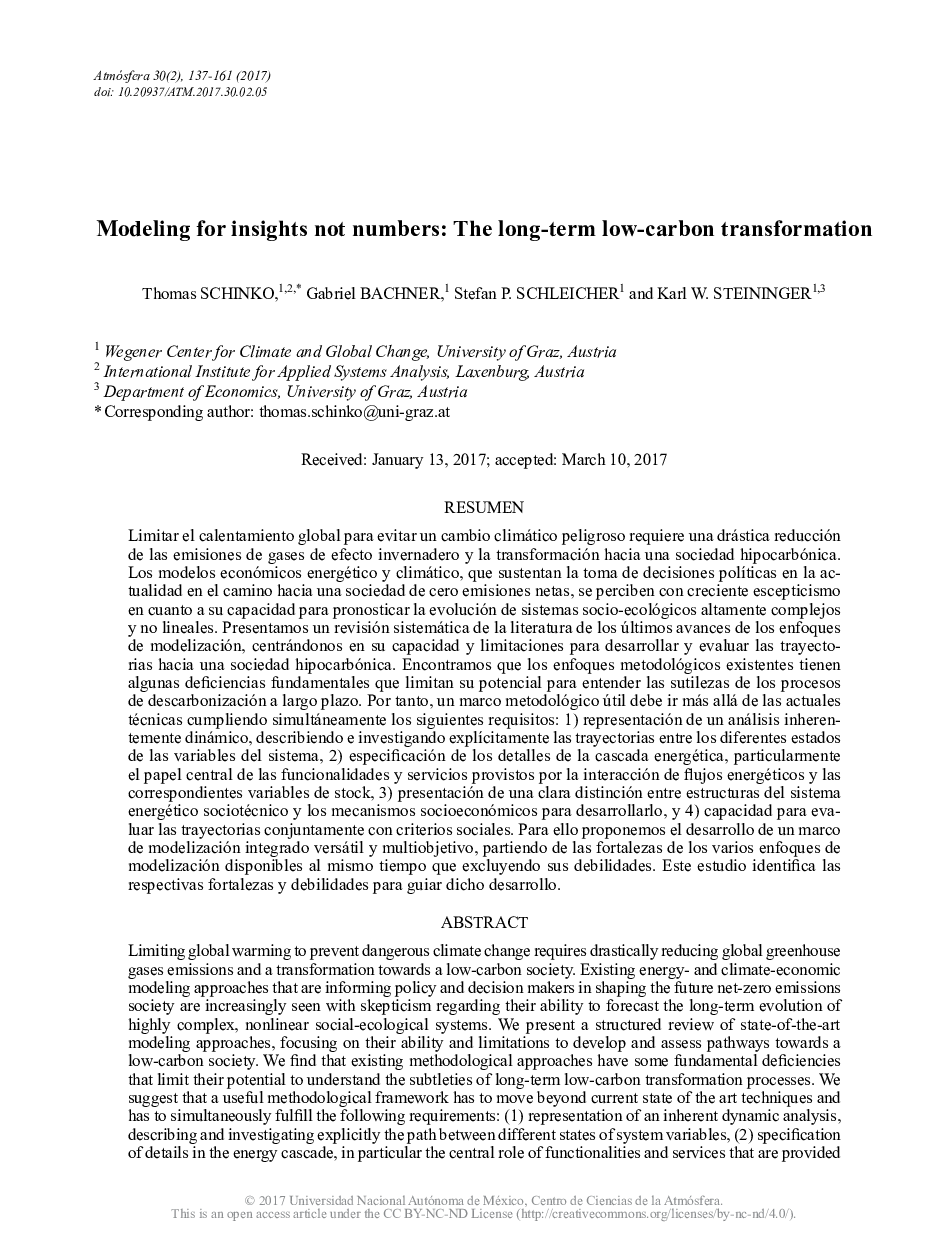| کد مقاله | کد نشریه | سال انتشار | مقاله انگلیسی | نسخه تمام متن |
|---|---|---|---|---|
| 8867215 | 1621525 | 2017 | 25 صفحه PDF | دانلود رایگان |
عنوان انگلیسی مقاله ISI
Modeling for insights not numbers: The long-term low-carbon transformation
ترجمه فارسی عنوان
مدل سازی برای بینش شماره نه: تحول کم کربن درازمدت
دانلود مقاله + سفارش ترجمه
دانلود مقاله ISI انگلیسی
رایگان برای ایرانیان
کلمات کلیدی
دگرگونی کربن، مدلسازی انرژی-اقتصادی، مدل سازی آب و هوا، بررسی ادبیات ساختاری،
ترجمه چکیده
محدود کردن گرم شدن کره زمین برای جلوگیری از تغییرات اقلیمی خطرناک، نیاز به کاهش شدید گازهای گلخانه ای جهانی و تبدیل شدن به یک جامعه کم کربن دارد. رویکردهای مدل سازی انرژی و آب و هوا که برای اطلاع رسانی به سیاست ها و تصمیم گیرندگان در شکل دادن به انتشار آینده خالص تولید ناخالص هستند، به طور فزاینده با شک و تردید در مورد توانایی آنها در پیش بینی پیشرفت درازمدت بسیار پیچیده و غیر خطی سیستم های اجتماعی-زیست محیطی دیده می شود. ما یک بررسی ساختاری از رویکردهای مدل سازی پیشرفته ارائه می دهیم، با توجه به توانایی ها و محدودیت های آنها برای توسعه و ارزیابی مسیرها به سوی جامعه کم کربن. ما دریافتیم که رویکردهای روش شناختی موجود، دارای برخی از کمبودهای اساسی است که محدود کردن توانایی آنها در درک دقیق بودن فرایندهای تحرک کم کربن درازمدت است. ما پیشنهاد می کنیم که یک چارچوب روش شناختی مفید، باید از حالت فعلی تکنیک های هنری فراتر برود و به طور همزمان نیازهای زیر را برآورده می کند: (1) نمایش یک تجزیه و تحلیل پویا ذاتی، توصیف و بررسی صریح مسیر بین حالت های مختلف متغیرهای سیستم 2) مشخصات جزئیات در آبشار انرژی، به ویژه نقش مرکزی ویژگی ها و خدمات که بوسیله تعامل جریان های انرژی و متغیرهای سهام مربوطه ارائه می شود، (3) تکیه بر تمایز روشن بین سازه های سیستم انرژی اجتماعی و اجتماعی اقتصادی مکانیسم ها برای توسعه آن و (4) توانایی ارزیابی مسیرها در معیارهای اجتماعی. برای این منظور، ما پیشنهاد توسعه یک چارچوب مدل سازی چند منظوره چند منظوره را با استفاده از نقاط قوت روش های مختلف مدل سازی در دسترس می کنیم و در عین حال ضعف های آنها را نیز حذف می کنیم. این مقاله نقاط قوت و ضعف مربوطه را برای هدایت چنین توسعه مشخص می کند.
موضوعات مرتبط
مهندسی و علوم پایه
علوم زمین و سیارات
علم هواشناسی
چکیده انگلیسی
Limiting global warming to prevent dangerous climate change requires drastically reducing global greenhouse gases emissions and a transformation towards a low-carbon society. Existing energy- and climate-economic modeling approaches that are informing policy and decision makers in shaping the future net-zero emissions society are increasingly seen with skepticism regarding their ability to forecast the long-term evolution of highly complex, nonlinear social-ecological systems. We present a structured review of state-of-the-art modeling approaches, focusing on their ability and limitations to develop and assess pathways towards a low-carbon society. We find that existing methodological approaches have some fundamental deficiencies that limit their potential to understand the subtleties of long-term low-carbon transformation processes. We suggest that a useful methodological framework has to move beyond current state of the art techniques and has to simultaneously fulfill the following requirements: (1) representation of an inherent dynamic analysis, describing and investigating explicitly the path between different states of system variables, (2) specification of details in the energy cascade, in particular the central role of functionalities and services that are provided by the interaction of energy flows and corresponding stock variables, (3) reliance on a clear distinction between structures of the sociotechnical energy system and socioeconomic mechanisms to develop it and (4) ability to evaluate pathways along societal criteria. To that end we propose the development of a versatile multi-purpose integrated modeling framework, building on the specific strengths of the various modeling approaches available while at the same time omitting their weaknesses. This paper identifies respective strengths and weaknesses to guide such development.
ناشر
Database: Elsevier - ScienceDirect (ساینس دایرکت)
Journal: Atmósfera - Volume 30, Issue 2, April 2017, Pages 137-161
Journal: Atmósfera - Volume 30, Issue 2, April 2017, Pages 137-161
نویسندگان
Thomas Schinko, Gabriel Bachner, Stefan P. Schleicher, Karl W. Steininger,
